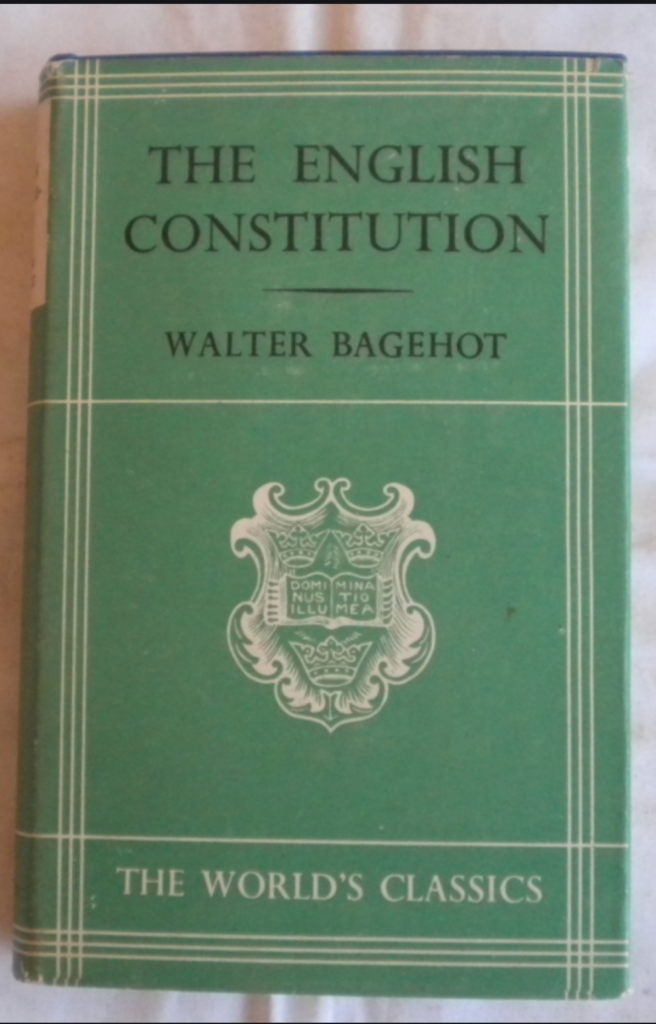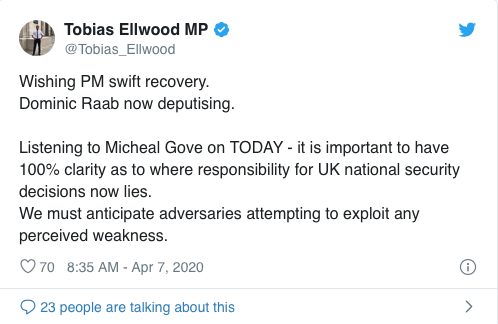The British Twenty-fifth Amendment

Spoiler alert: there isn’t one. In the event of the incapacitation of the executive, there is no constitutional “Plan-B”.
I was told that the Cabinet Manual might cover it, which is perhaps the closest that the British have to an operations manual for the government. However, a skim of its 11 chapters and 100+ pages did not reveal the secret. It does include around 450 words detailing the succession, coronation, absence or incapacity of the Sovereign, but I couldn’t find anything on the incapacitation (or worse) of her Prime Minister. But, should we really be surprised considering that this country has been constitutionally winging it for over 800 years?
There is an occasional job of Deputy Prime Minister, but it holds no real constitutional standing, and in any event has not been filled since the dissolution of the coalition government on 8 May 2015. The media reporting around Boris Johnson’s admittance to intensive care last night has been confidently pointing to Dominic Raab, not in his role as Foreign Secretary, but rather his position as First Secretary of State, as our Plan B. “Mr Raab, as first secretary of state, is the designated stand in.” But this, too, is a bit of a stretch and constitutionally squishy; the post of first secretary of state has been vacant nine of the last 23 years, and all it really means is that within the context of cabinet, the first secretary of state is senior to his (or her; interesting aside, the last female first secretary of state was Barbara Castle, from April 1968 to June 1970; after Castle the office was vacant for 25 years) peers. It does not confer any additional executive responsibilities or as a formal stand in role should the PM become incapacitated. The only reason Raab is currently holding the role as Acting Vice Prime Minister is because Johnson granted it to him.
So, I’m going to wing it a bit here as well. Theoretically, the UK is governed by cabinet rather than a single executive, so in terms of the day-to-day operations of government, the office of Prime Minister can be a bit overstated. Individual cabinet secretaries can hold (depending on the office) significant powers in their individual remits, and they can practice considerable autonomy depending on the political strength (or weakness) of the Prime Minister as party leader, or in the case of a formal coalition, within parliament. Again, in theory, the United Kingdom can operate without a Prime Minister. The post is a result of convention rather than constitution (which is in part why the Cabinet Manual makes the succession of the sovereign clear, yet remains silent on that for Prime Minister). Raab, as the anointed deputy, can execute most governmental functions in concert with the rest of the cabinet. The only areas where this seems even hazier than is typical for British constitutional governance is if urgent military action is required or if an individual minister needs to be replaced (could he conduct a reshuffle?).
Indeed, just five minutes ago (at 0855 BST), the Conservative MP who chairs the defence select committee tweeted requesting clarity on the defence issue:

The holder of the office is in the gift of the sovereign, so long as the existing Prime Minister has the confidence of the House of Commons. Should the Prime Minister die, the Queen would request a member of the cabinet to form a new government, on an interim basis, which itself would be led by whomever the cabinet decides to put forward, while the Conservative Party gets on with the basis of electing a new party leader. The Queen could ask Raab his advice on who should form a new government, at which point he would report the thinking of cabinet. That part is pretty simple. What isn’t simple is if Johnson remains incapacitated for a significant period of time. Given there is no Amendment XXV, there’s no Section 3 of the same. My semi-educated guess is that the current state of affairs would continue so long as cabinet tolerates it. In other words, “According to the Institute for Government think tank, prime ministers continue in office unless they resign or die.”
While it’s been widely reported this morning that Johnson is not on a ventilator per se, and it’s been speculated that this was a precautionary move should things take a more sudden turn south, the numbers below don’t suggest optimism (I’ve seen a couple versions of this table in the past 12 hours, but I do not have a firm citation for it, so YMMV):

The most recent British Prime Minister to die in office was Lord Palmerston in October 1865 (there have been five US Presidents to have died in office since Palmerston’s passing at the age of 80). And it should go without saying, as I know our readership is of a high standard, but just to be safe: you might disagree with his politics, his party’s lack of support for the NHS in the past decade, and you may disagree with his handling of the crisis, but don’t do that.
And on that note, I’ll conclude on the hope that Dominic Raab has watched this:
